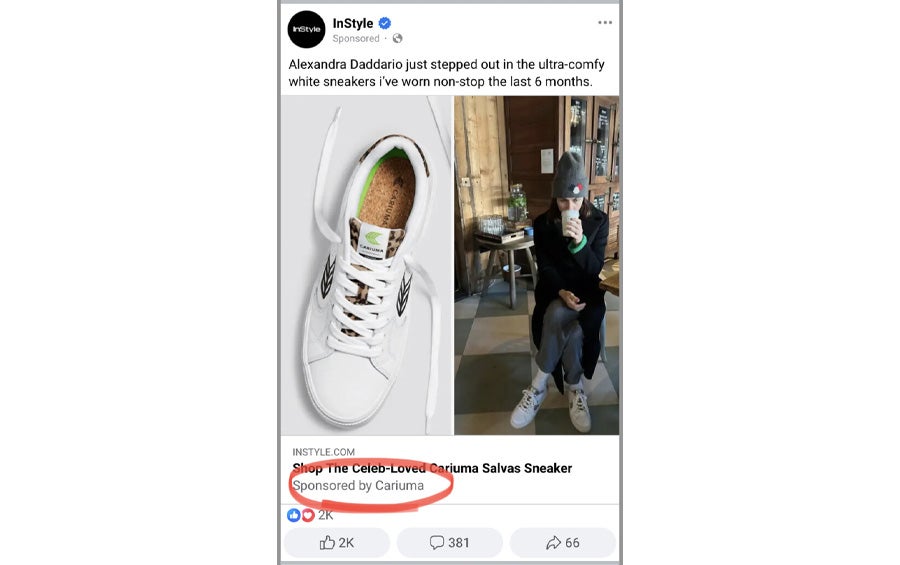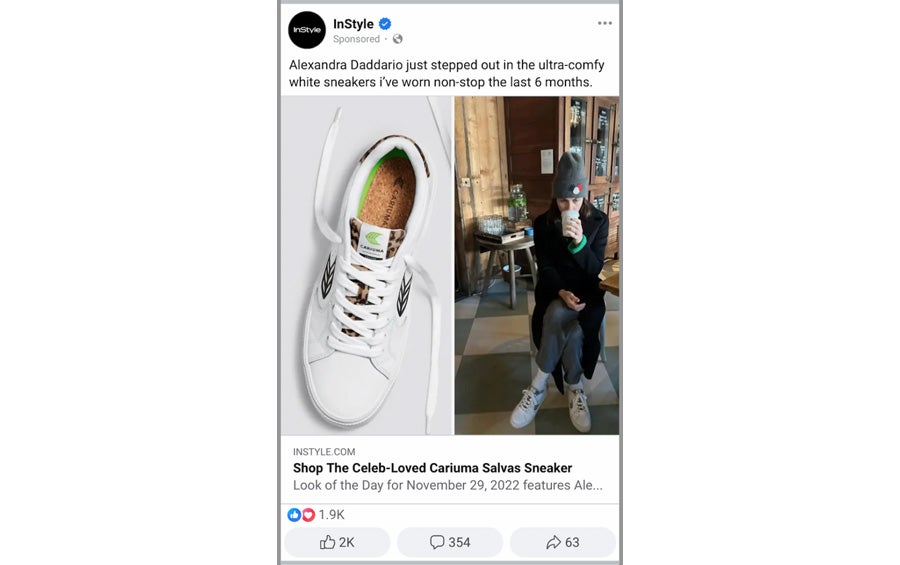When Is a Sponsored Disclosure Insufficient to Disclose a Material Connection?
This InStyle social media post for Cariuma sneakers has the disclosure “Sponsored” in faint gray font under the publisher’s name. Was the post sponsored by InStyle or Cariuma? It is hard to tell.
Through its routine monitoring program, the National Advertising Division (NAD) of BBB National Programs recently inquired about three similar social media posts promoting Cariuma sneakers. The social media posts appeared on the Instagram and Facebook accounts of Travel + Leisure, US Weekly and The Quality Edit. Like the InStyle post, the posts were labeled “Sponsored” below the name of the publisher. The posts included images of Cariuma sneakers and invited consumers to “shop here” or “learn more” about the sneakers.
The NAD stated that these sponsored posts are advertising but appear in a format that makes them look like editorial content. The NAD conducted the inquiry because it was “concerned about the blurring of the line between editorial content and advertising in a way that can confuse consumers.”
According to the NAD decision, the Travel + Leisure social media post was titled “Celebrities like Helen Mirren and Jon Hamm are fans of the wear-anywhere sneakers that have gotten an upgrade for fall” and displayed a pair of Cariuma sneakers in the center of the post with a link to the publisher’s website and another link to “Learn More.” The US Weekly social media post was titled “Back in Stock! Shop These Sustainable Sneakers Before They Sell Out Again” and displayed three Cariuma sneakers in the center of the post with a link to the publisher’s website and another link to “Shop Now.” The Quality Edit social media post states, “With seemingly every celebrity’s and their mother’s blessing, I recently tested a pair to see what the hype is about and my feet have thanked me each day since.” Below an image of a person wearing a pair of Cariuma sneakers is a link to the publisher’s website and a link to “learn more.”
The decision states that Cariuma sends Travel + Leisure and US Weekly press pitches for articles and social media posts about its sneakers. The publishers are paid a commission for all products purchased by consumers who click on Cariuma’s link in the articles and social media posts. Cariuma has a contract with The Quality Edit to elevate brand awareness and drive purchaser volume with published articles and social media posts about Cariuma and its sneakers. As to all three publishers, once a story is published, Cariuma may request that the publishers “amplify” an article by using the article and/or pictures from the article in a post on their social media webpages on platforms including Facebook and Instagram. Amplified posts may result in further commissions to the publishers and sales for Cariuma via the embedded links.
The NAD assessed whether the content of these social media posts, which includes affiliate links but appears to be editorial, is advertising and whether the content was created independent of the “economic or commercial motivation” introduced by affiliate marketing revenue.
The NAD and National Advertising Review Board (NARB) Procedures define advertising as a “paid commercial message … [that] has the purpose of inducing a sale or other commercial transaction or persuading the audience of the value or usefulness of a company, product or service.” The NAD stated that Cariuma retains full editorial control over the creative content with The Quality Edit and must approve any content before publication. The NAD also stated that Cariuma selected and paid for each amplified social media post with the publications. Therefore, the NAD determined that the posts are paid endorsements for Cariuma sneakers.
The NAD concluded that while the posts were labeled “Sponsored,” it was not clear whether the posts were sponsored by the publisher or by Cariuma. The NAD stated that the posts “do not identify the material connection between the publisher and Cariuma. As a result, consumers are not aware that the posts are paid endorsements by Cariuma.”
The NAD noted that the Federal Trade Commission’s (FTC) Guides Concerning the Use of Endorsements and Testimonials in Advertising provide that when there is a connection between the endorser and the seller of an advertised product that might materially affect the weight or credibility of the endorsement and the connection is not reasonably expected by the audience, the connection must be disclosed. The NAD further noted that the FTC’s recent FAQ guidance, FTC’s Endorsement Guides: What People Are Asking. states that there may be some instances where a “Sponsored” disclosure alone may not alert consumers that the post is actually advertising, and that it would be clearer if the post identified the brand that sponsored the social media post. The FAQs state:
- “Simply tagging a post … an #ad might be fine, but it could be confusing in some circumstances. When the sponsor’s identity is unclear but would matter to consumers, the sponsor should probably be identified.”
- “The FTC doesn’t mandate the specific wording of disclosures. Regardless of the advertising medium or platform, the same general principle applies: people should get the information they need to evaluate sponsored statements. Starting a post with ‘Ad:’ or ‘Paid ad’ or ‘#ad’ or ‘Advertising:’ or ‘Advertisement’ would likely be effective. The words ‘Sponsored’ and ‘Promotion’ at the beginning of a post might also be effective, but ‘Sponsored by XYZ’ or ‘Promotion by XYZ’ would be clearer (where ‘XYZ’ is a brand name).”
The NAD recommended that Cariuma “clearly and conspicuously disclose its material connection to the endorser and publisher of the social media posts.”
According to the organization Truth in Advertising, Cariuma has modified its social media posts following its inquiry and the NAD decision. The InStyle post pictured above has been edited to disclose that it is “Sponsored by Cariuma,” with the disclosure appearing at the bottom of the post.

Why It Matters
Advertisers can be held responsible for inadequate disclosures in advertising, including social media posts, regarding the identity of the sponsor. The FTC recently sent warning letters to trade associations and social media influencers emphasizing the need to clearly identify the sponsor of social media posts. The letters say that the influencers failed to adequately disclose that they were paid by industry.
The NAD decision reinforces the principle that when it is unclear to consumers, the sponsor of an endorsement should be clearly identified in a social media post. A clear disclosure such as “Sponsored by [name of sponsor],” conspicuously placed, generally is effective.

